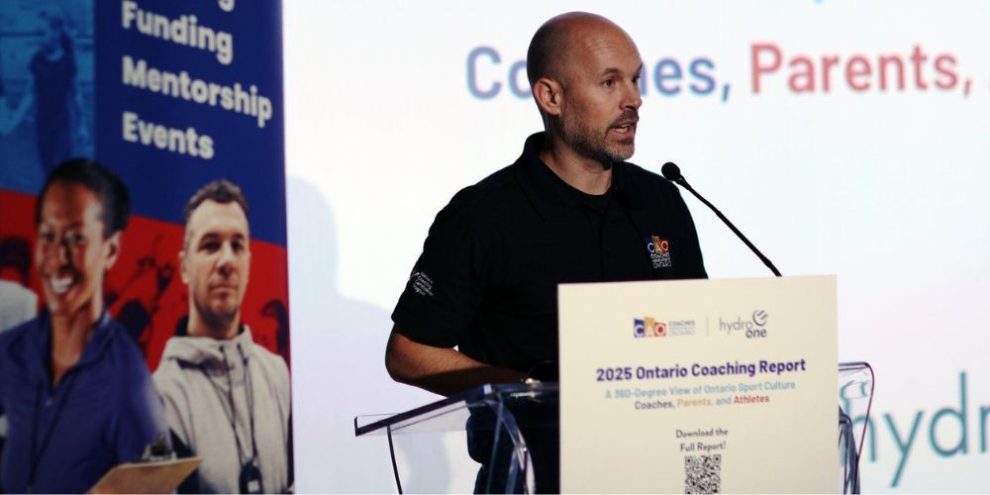
Over-specialization in young athletes, hazing, and poor communication between parents and coaches are just some of the issues raised by a new report.
The Coaches Association of Ontario issued its 2025 report — the third in a series — this week, offering a "360-degree view" of sport culture in the province. An hour-long panel presented and reflected the findings on Tuesday, with speakers focusing on those key issues to improve youth sport.
"As a community coach myself, I have found the reports very helpful," said CAO executive director Jeremy Cross in his opening remarks at the Hockey Hall of Fame in downtown Toronto.
"As I reflect on my own values and behaviours, I find myself thinking critically about how to stay true to those values in times of high pressure and intensity in the playing field, and I hope that others will be able to examine their own coaching to become the best version of themselves as a coach for the athletes and participants that they lead in their communities."
Barrie's News Delivered To Your Inbox
By submitting this form, you are consenting to receive marketing emails from: Central Ontario Broadcasting, 431 Huronia Rd, Barrie, Ontario, CA, https://www.cobroadcasting.com. You can revoke your consent to receive emails at any time by using the SafeUnsubscribe® link, found at the bottom of every email. Emails are serviced by Constant Contact
CAO partnered with Hydro One and Leger to create the study. It was based on a survey of 1,000 coaches in Ontario between Aug. 6 and 21, 2024, as well as surveys of 502 athletes aged 6-24 and 501 parents of athletes in the same age group. The latter surveys were completed between June 4 and 20, 2025.
The 2025 Ontario Coaching Report found, among other things, that early specialization continues to be a problem in youth sports. Half of all coaches, athletes, and parents that responded to the surveys believed it is appropriate to specialize in one sport before age 12, years earlier than the national sport system recommends.
A quarter of respondents said that they think youth athletes should be specializing in one sport — with a focus on competitive results — as young as age nine.
Dr. Katie Johnson, a research associate at the Tanenbaum Institute for Science in Sport, and Dr. Sasha Gollish, a professor at the University of Toronto's Institute for Studies in Transdisciplinary Engineering Education and Practice, both spoke about specialization at the CAO event.
"This is a concern because specializing too soon narrows development and assumes that we already know what a young person will be good at," said Johnson. "In reality, we have little evidence that we are good predictors of someone else's future.
"In fact we are not even good at predicting how a professional athlete will do one year later, (professional athletes) who are fully adults and we have decades of sport data on them. So how could we possibly do that with a nine-year-old?"
Gollish opened her remarks by sharing the story of how she won a bronze medal at the 2015 Pan American Games in the women's 1,500-metre race because her instincts from years of training in alpine skiing kicked in.
"Excellence is not perfection. It's perseverance, it's tenacity, it's dedication, it's love of your craft," said Gollish with her PanAm medal in hand. "Excellence is curiosity. It's the freedom to try to fail, to switch sports, to come back, to reinvent and to begin again."
Hazing remains widespread with 90 per cent of coaches, athletes and parents in agreement that it's a problem, yet only two in five coaches say they always intervene when it occurs. The report found that hazing most often happens in schools, among older athletes, and increases with athlete age.
One in seven athlete respondents said they experienced hazing between the ages of six and nine, but nearly one in two said they had experienced it by the time they were between the ages of 19 and 24.
Dr. Jay Johnson, a professor at the University of Manitoba who has published extensively on hazing, said that the CAO report exposed a disconnect between athletes and coaches.
"Coaches, who (as former athletes) have gone through that and have been hazed, develop blind spots, they don't necessarily see it as hazing," said Johnson. "Four in 10 coaches, which from my perspective is still a pretty low percentage, think that they are setting parameters around hazing, what to do what not to do, talking to their athletes about hazing.
"What do you think the percentage is from the athletes that were asked the same question? It's a lot lower. One in 10 feel that their coach is actually doing that."
The report also says that coaches are overestimating their connection with their athletes as fewer than one in five athletes say their coach regularly checks in about mental health or personal challenges.
This report by The Canadian Press was first published Nov. 27, 2025.





